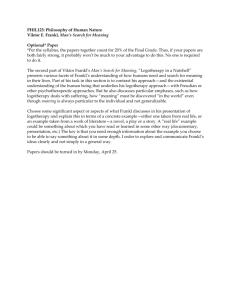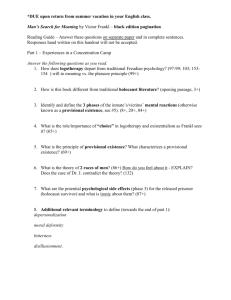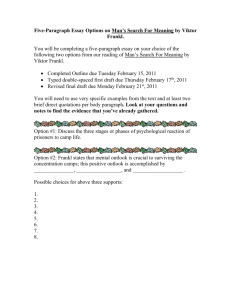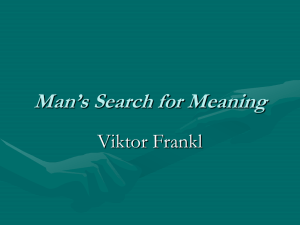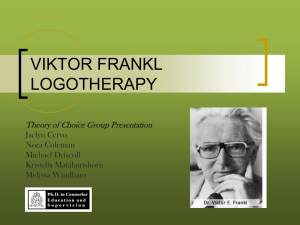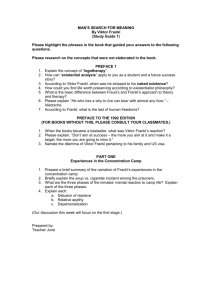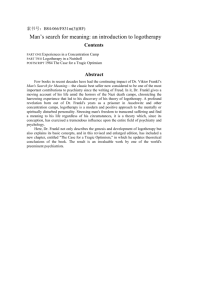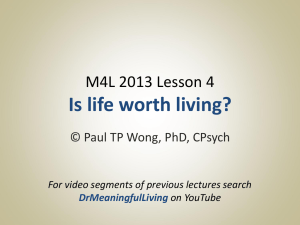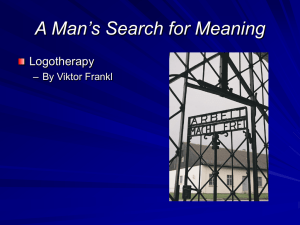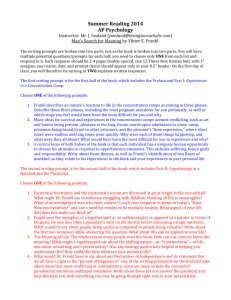Logotherapy
advertisement
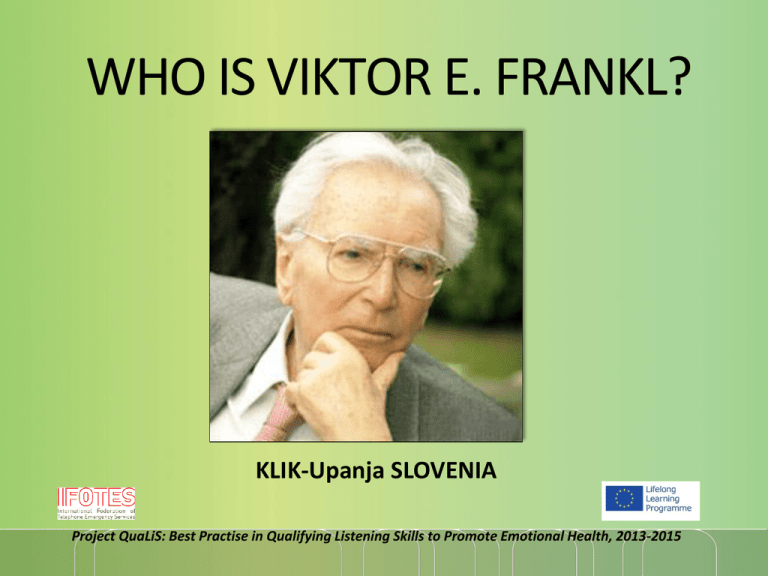
WHO IS VIKTOR E. FRANKL? KLIK-Upanja SLOVENIA Project QuaLiS: Best Practise in Qualifying Listening Skills to Promote Emotional Health, 2013-2015 VIKTOR E. FRANKL Austrian neurologist, psychiatrist, * 26th March 1905, Vienna, † 2nd September 1997, Vienna Born: March 26, 1905, Vienna Died: September 2, 1997, Vienna Academic titles: M.D. (1930), Ph.D. (1949) Family: First marriage (1941) with Tilly, b. Grosser (died in Bergen-Belsen 1945) Second marriage (1947) with Eleonore, b. Schwindt Daughter Gabriele; 2 grandchildren, Katharina and Alexander 3 great-grandchildren, Anna, Paul, and Elena Life and Work Viktor Emil Frankl, M.D., Ph.D. was Professor of Neurology and Psychiatry at the University of Vienna Medical School. 1940-42 Frankl was director of the Neurological Department of the Rothschild Hospital During World War II he spent 3 years in various concentration camps, including Theresienstadt, Auschwitz, and Dachau. 1946-70 he was director of the Vienna Neurological Policlinic. He was Visiting Professor at Harvard and at universities in Pittsburgh, San Diego and Dallas. The U.S. International University in California installed a special chair for logotherapy - this is the psychotherapeutic school founded by Frankl, often called the "Third Viennese School" (after Freud's psychoanalysis and Adler's individual psychology.) He received 29 honorary doctorates from universities in all parts of the world. Frankl held lectures at 209 universities on all 5 continents. Frankl was a mountain guide in mountaineering club "Alpenverein Donauland" in Austria. Are named after three difficult climbing routes in the mountains of Rax and Peilsten. In later years in the United States earned a certificate for a one-seater airplane pilot. "The responsibility of man is something terrible, but at the same time wonderful! Straight frightening is that I have at all times responsible for the other, that every decision - from the smallest to the largest - the decision "forever and ever" and that at any moment seize or squander that opportunity. every moment brings thousands of options, but you can choose only one but with all the other condemn the lack of, as well as "forever and ever." However, it is wonderful the realization that my own future and the future of things and people around me at any time depends on my decision to make the prospect even so small. What realize at the moment and this is what I get in life, rip into reality and away from some of passing. " LOGOTHERAPEUTIC NOTION OF HUMAN Man is as three-dimensional being at every point and in every corner of the man are all three dimensions, which are combined into a whole. Frankl speaks of psychophysical parallelism, where the parallelism means that the interaction (somatic and psychological dimensions) is so big that when something happens to one, the second immediately arises reaction to these happening. For example: hunger is a psychological experience or feeling, which has its parallel body: blood sugar is lowered, the stomach is empty and growling. The third dimension is a little different because it is not so firmly attached to parallelism. Here there is room for freedom, a man may go over the psychophysical chaining. There a human meets with himself. Man here can withstand its psychophysical - I'm completely tired, but I'm going to bring this work to an end. Only man is able to resist its psychophysical. Body dimension is the simplest, easiest to explore, measure and understand. Psychological dimension is no longer so simple to understand. It is difficult to measure fear or joy. Spiritual dimension contains freedom. You can not assume anything here or measured. Here we find love, self-overcoming, ethical feelings, conscience, sense of values, issues of death, creation. . Psychological and somatic comes from the parents. From where it comes spiritual? . Frankl says that for the wrong questions we can not get the right answers. Spiritual is outside of space and time. Without the merger of wife and husband, so with no sexual act, it is no human, but only the sexual act is not enough to obtain a human. It must come the third person, the spirit. . Logotherapy argues that at the conception comes close the spiritual and spiritual personality is immediately present, although still slumbers. A spiritual person is waiting for her instrument, which is part of the psychophysical personality to perfection differentiate and develop in order to become useful. . Example of building materials and contractor: the material can be good or bad, it can be a lot of it or a little. The question is, what will the constructor do with the material. We need a minimum of material. Some of the best marble do nothing. The other from a little less good material make beautiful things. What can a man with the assigned spirit of the assigned yet upgraded? We need to raise the man in the position of the builder, so he can not identify with construction materials. It is always necessary to remember: you're not a building material, you are developer. Every man has a lot of choices in their lives and to be human is a possibility that arises from this, for what he chooses to be realized. At the moment when I am taking the choices as a person, I am taking the choices as a spiritual person. Biological dimension we inherit from our parents / it represents the minimum subsistence level. Psychological dimension is in part inherited, part of its development under the influence of the environment / parents and others .. Spiritual dimension comes from the Absolute spirit. In a moment of conception enters a third person beside "tertium Datur". So man is a creature of earth and heavenly roots. LOGOTHERAPY is the psychotherapeutic direction, which is focused on solving human problems and hardships through his original human dimension of freedom and responsibility, energy is supplied primarily to the original motivation of the human will to meaning. . Logotherapy mainly deals with neurotic disorders resulting from existential emptiness (or frustration, deprivation - the lack of a sense that life is meaningful) and the patient tries to find meaning in life. SPIRITUAL DIMENSION: free will, responsibility, conscience The man has a need to find meaning of his life and purpose of the moment in which he lives. The meaning is given to us, we do not invent it but we discover it in moment by moment in our life or career. We were not created to achieve homeostasis, but in order to achieve the ambitious goals that we have laid on the path. Nobody instead of us can not created them. The meaning of our existence is created through the love of someone or something (a project, hobby enjoyment in a lovelyness, suffering ...) Meaningful job is the best prevention of all diseases, as well as the best medicine. With love for someone or something, we forget ourself (autotranscendenca), we are surpassing the victious circle egocentrizm and we are committed to each other. In this giving to others we are experiencing happiness and contentment. Ability to avtotranscendence connects us with the Absolute spirit, the Transcendence and without it we can not understand our existencial. Frankl was talking about the existential vacuum of modern man. He spoke that today people do not come to the doctor because they are in pain, but they want to get the answer to the question of meaning. Without this answer, it is difficult to live and a man can in this point of view be in suicidal risk. Frankl has this situation is called "noogenic neurosis or noogenic depression" and he realized that about 2 5% of people who come to the doctor, they come because of noogenic neurosis or depressions. It is important that volunteers on the phone have a positive attitude to life and that they believe in an absolute sense/meaning and that they are filfiled with joy for life. Help in a crisis situation: (The question is for the whole group! Post by show of hands!) Important question: What kind of attitude a person has to life crisis? Which answer is in the connection to logotherapy? a) The crises in life are unnecessary! b) What have I committed to someone that I am now in such trouble? c) Whose fault is it that I am in this situation? d) I am not able to solve the crisis, so I will not even attempt. e) The crisis is a life task that gives me the opportunity for personal growth. Ideal posture from psychohygienyc position: The crisis is a task that is intended for me. In itself I have the potential to solve it. The crisis is an opportunity to change behavioral patterns for the better. The crisis stimulates my creativity, help me to listening to the voice of conscience with full responsibility choose the most sensible solution. Logotherapy rests on three basic pillars, or three fundamental assumptions. Meaning of life Freedom of will Will to meaning Meaning of life The Philosophy of Meaning of Life starts with the basic conviction that “…life has unconditional meaning, which can not vanish under any circumstance”. In other words, that life holds a meaning in any situation, even the most miserable. . A uniquely human capacity that we all have, and which is similar to a pre-knowledge, or awareness of meaning in our lives, is called intuition. Our intuition is a foreknowledge, that our existence is basically wanted in the word. . The whole of life is meaningful, and therefore, every moment in life is meaningful. As the whole of life has meaning, every person is intended, every persons‟ situation offers unique meaning possibilities to be fulfilled. (Lukas, 1995). According to Frankl, to be free, and conscious, is to be responsible: Responsible for our own life, and for the life of others, to life. Freedom of will Human beings are the only creatures who are can reach beyond themselves in the search for purposeful goals and values. They have a body, and a mind. But beyond, their bodies and minds, they are equipped with Freedom of Will to explore, and to decide, the direction of their actions, even if this means acting in the belief of something that is greater than them. The key to understanding Frankl‘s concept of the Freedom of Will is the inclusion of a third dimension in human existence (Tertium Datur), aside from the planes of body and mind. While in body and mind we are determined, and/or influenced by physical, and psychological mechanisms, there is a dimension--a uniquely human dimension— which allows us to reach beyond ourselves in the search for meaning. This dimension is called the Noetic dimension. . ―It is seen as our main motivation for living and for acting, and it goes deeper than the will to pleasure and power. When we see meaning in life, we are willing to endure any suffering. On the other hand, if we see no meaning, even a life of well-being will seem empty and futile‖ (Barnes, 1995; p. 9). Everybody wants to be successful, and to accomplish something worthwhile in life. The will to meaning ―Logos‖ is a Greek word. It can be translated as ―Reason,‖ or ―Meaning‖ (Frankl, 1984b; p. 74). The literal translation of the word logotherapy is ―therapy through meaning‖ (Frankl, 1984). It can also be translated as ―healing through meaning,‖ (Frankl, 1984b; Introduction). Through its tenets and principles, logotherapy is a meaning-centred psychotherapy. . The existential background for the Will to Meaning is related to the nature of human existence: No other creature, but human beings in the history of evolution reached the point of being aware of, and confronted with life‘s finiteness, and mortality. The motivation concept in the Will to Meaning means that every human being is inspired by a striving and yearning for meaning. . ―It is seen as our main motivation for living and for acting, and it goes deeper than the will to pleasure and power. When we see meaning in life, we are willing to endure any suffering. On the other hand, if we see no meaning, even a life of well-being will seem empty and futile. Everybody wants to be successful, and to accomplish something worthwhile in life. Frankl notes, "...there were always choices to make. Every day, every hour, offered the opportunity to make a decision, a decision which determined whether you would or would not submit to those powers which threatened to rob you of your very self, your inner freedom; which determined whether or not you would become the plaything of circumstance, renouncing freedom and dignity to become molded into the form of the typical inmate. All psychotherapies make philosophical assumptions about the human persons that cannot be proved with certainty. The assumptions of Logotherapy include: 1. 2. 3. 4. 5. 6. The human being is an entity consisting of body, mind, and spirit. Life has meaning under all circumstances, even the most miserable. People have a will to meaning. People have freedom under all circumstances to activate the will to find meaning. Life has a demand quality to which people must respond if decisions are to be meaningful. The individual is unique. How to find meaning in life? 1. Creativity (giving something to the world through selfexpression: using our talents in various ways; i.e., the work we do, the gifts we give to life). 2. Experiencing (receiving from the world: through nature, culture, relationships, interactions with others and with our environment). 3. Change of attitude (even if we can't change a situation or circumstance, we can still choose our attitude toward a condition; this is often a self-transcending way of finding meaning, especially in unavoidable suffering). What pulls us ahead in life? Happy events. Life goals. Placing values. Elastic scale. Making decision (required has to decide, even if we choose poorly - takes responsibility). Gratitude. Deviation. Silence. Specific Logotherapeutic Techniques Paradoxe intention The therapist encourages the patient to intend or wish for, even if only for a second, precisely what they feat. Dereflection The therapist diverts the patients away from their problems towards something else meaningful in in the world. . Socratic dialogue Change of opinion Method that helps in converting negative, unhealthy views in a positive, healthy position. WORKSHOP DEREFLECTION Imagine that you are part of the group where everybody speak depressive/sad things. How does that influence you? How would you feel if people around you would talk about positive things? Which one do you choose in your ordinary life? Would you like implement some changes and how? SOCRATIC DIALOGUE The Socratic dialogue is the vehicle for mobilizing the inner resources of the human spirit. The general rules of the Socratic Dialogue are the following: 1. The questions are aimed to stretch thinking further, and are specific; 2. The questions are open-ended rather than closed; 3. The questions are thinking-oriented rather than feeling-oriented; 4. The questions start from the present or the past, and are futureoriented; 5. The questions aim to facilitate: (a) Self-discovery [knowledge]; (b) Choice [decisions]; (c) Uniqueness [Personal Significance]; (d) Responsibility; (e) Self-transcendence; (f) Clarify Needs, and Values. What are some of your greatest strengths?” “Whew was the time that someone expected the very best of you?” (b) “What are two things you may do in the future that as of yet you have not done?” What was time when you put off something you should have done right away?” (c) “What was it like for you when someone did not accept your point of view?” “What would you say were „key‟ turning-points in your life?‟ (d) “What was one thing you forced yourself to so and it was good afterwards?” “What are some things you want to learn in the future?” “What are some things you want to learn in the future?” “Name something that you finished that you had a hard time starting?” (e) ―When was a time when you put energy into something you believed in?‖ ―When was a time that you were of real help to someone in difficulty?‖ (f) “What are three things that someone else wants you to be?” “What are two things that are difficult for you to accept?” WORKSHOP Please choose from one crisis situation and write it down. Then, each read your situation and we will choose one. To selected situations we are gonna set up key questions after Socrates' dialogue!
